
By Lacey Williams - CollabraLink Intern to NOAA Office of Ocean Exploration and Research
July 4, 2016
Lacey Williams is a recent graduate of Colgate University and spent time shadowing and working with NOAA Office of Ocean Exploration and Research personnel as they planned and executed different aspects of the 2016 Deepwater Exploration of the Marianas expedition as part of her CollabraLink internship.
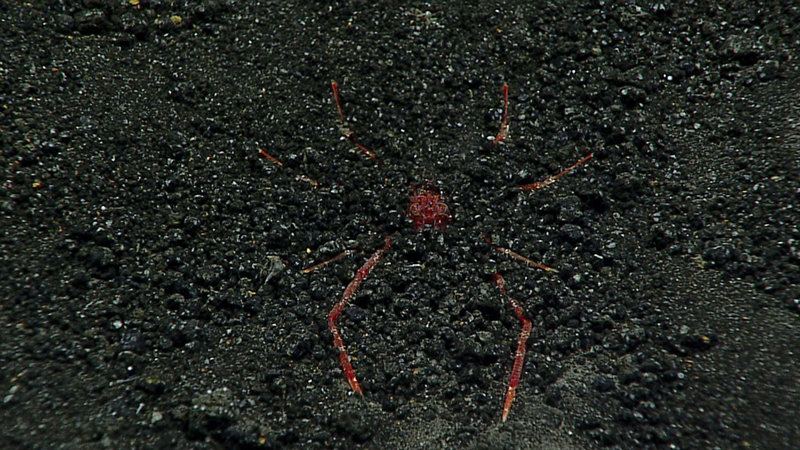
Many organisms have unique adaptations to live in the deep sea. This squat lobster buries itself in the sediment likely to avoid being eaten. There is so much that can be learned about the deep sea just by taking a close look. Image courtesy of NOAA Office of Ocean Exploration and Research, 2016 Deepwater Exploration of the Marianas. Download larger version (jpg, 1.0 MB).
If you ask any individual about the importance of exploration, odds are they could easily rattle off at least two to three reasons that they feel are or were important at some point in history. However, when most people think of exploration, often marine expeditions are not the first idea that comes to mind.
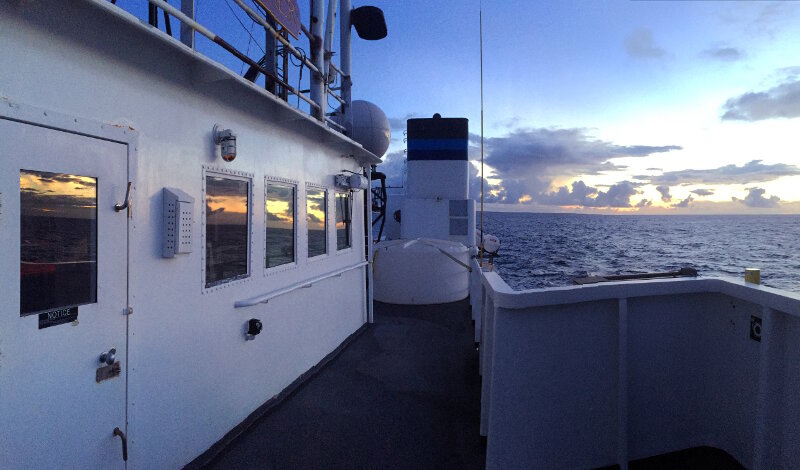
Sunrise aboard NOAA Ship Okeanos Explorer as the crew preps for another day of collecting critical baseline information in some of the most unknown areas of our ocean. Image courtesy of NOAA Office of Ocean Exploration and Research, 2016 Deepwater Exploration of the Marianas. Download larger version (jpg, 9.7 MB).
As a species historically driven by exploration, discovery, and investigation, you would think we would jump at the chance to uncover the secrets of the environment that overwhelmingly dominates our home planet. Although a naturally terrestrial species, human populations congregate around water. It is overwhelmingly our most precious resource, and yet over 90 percent of the ocean remains unexplored. After conquering the hottest deserts, summiting the highest mountains, and even surpassing our own atmosphere, the interest for and awareness of the need for ocean exploration still remains relatively low on most people’s priority list.
In an era known for remarkable advances in technology, only a handful of ships have deep-sea exploration capabilities and even fewer have the ability to share discoveries with the world in real time. One of the pioneers in uncovering this largely unknown territory is NOAA Ship Okeanos Explorer. Unique not only in its technological capabilities, the ship’s mission revolves around uncovering never before seen areas of the ocean, with the hopes of inspiring waves of new research around its discoveries.

One of the many unidentified organisms seen during the 2016 Deepwater Exploration of the Marianas expedition. This organism was so unusual that the science team had difficulty placing it into any higher taxonomic group. Image courtesy of NOAA Office of Ocean Exploration and Research, 2016 Deepwater Exploration of the Marianas. Download larger version (jpg, 600 KB).
For two weeks of my internship, I shadowed personnel in NOAA’s Office of Ocean Exploration and Research (OER) office before and during the third leg of the 2016 Deepwater Exploration of the Marianas expedition on the Okeanos Explorer. I’ve had a love of the ocean my entire life and was fascinated to learn about the day-to-day operations of an expedition. While many people will remember the discovery of “Casper” the octopus in February 2016, which received much of the media’s attention due to the octopus’s unique looks, I was surprised and thrilled to learn about the frequency with which new species, geological formations, and benthic habitats are being discovered on each cruise.
Some observations, however, point not only to the beauty and wonder of discovering deep-ocean habitats, but also to the importance of protecting them. A mission log from Leg 1 of this expedition chronicled the presence of marine debris during several dives. It was disheartening to learn that even in a marine national monument covering one of the deepest spots in the ocean, human-made items, such as plastics and cans, were found.
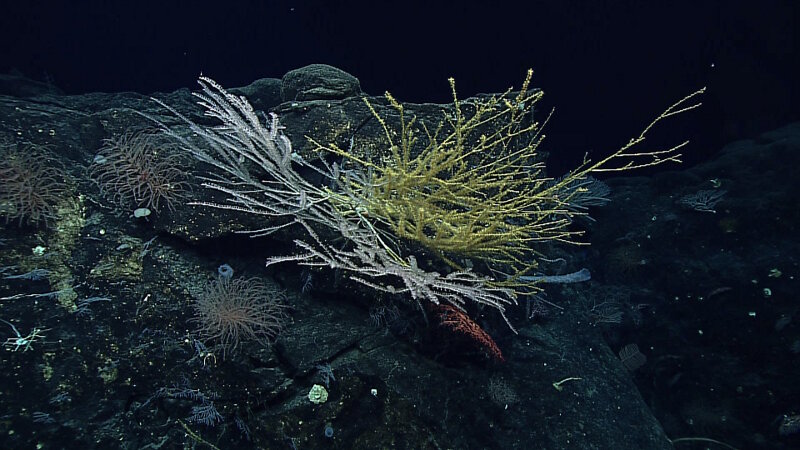
We have only just begun to understand the deep sea and there are many more hidden treasures still out there. During this expedition, scientists explored Vogt Seamount and found an incredible diversity and high density of deep-sea corals. In this image alone, there are over seven types of corals, with some of the larger corals measuring over a meter. Image courtesy of NOAA Office of Ocean Exploration and Research, 2016 Deepwater Exploration of the Marianas. Download larger version (jpg, 982 KB).
There’s a famous quotation by Baba Dioum, often cited as support and justification for exploration that reads, “In the end we will conserve only what we love; we will love only what we understand; and we will understand only what we are taught.” We can only be taught what we learn about, what we discovered.
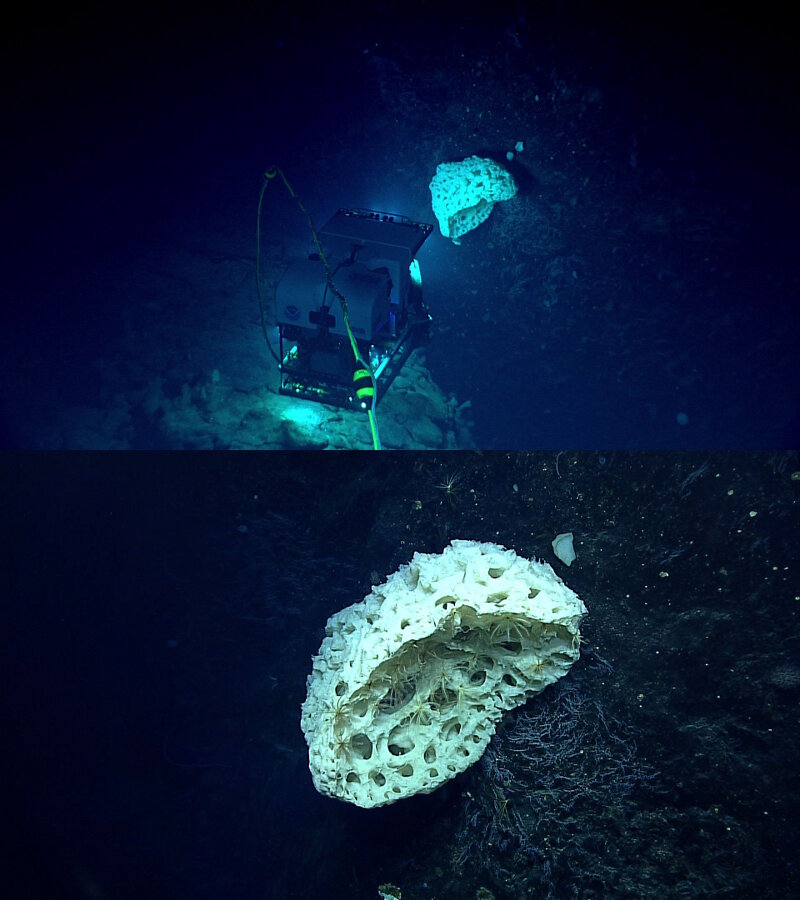
This large sponge was seen on Leg 3 Dive 19 at Vogt Seamount. One of the exciting things I learned during this expedition from Science Lead Dr. Shirley Pomponi is that sponges hold the potential for the development of new medical agents and therapeutic treatments of cancers and other diseases. Image courtesy of NOAA Office of Ocean Exploration and Research, 2016 Deepwater Exploration of the Marianas. Download larger version (jpg, 1.2 MB).
Some people might say that we have used and abused the ocean as a limitless resource because we did not understand it. To some extent, this is true. We do not yet fully understand what it contains, how it works, and how much we depend on it. That it is necessary now more than ever to explore our ocean and convey discoveries made to the public.
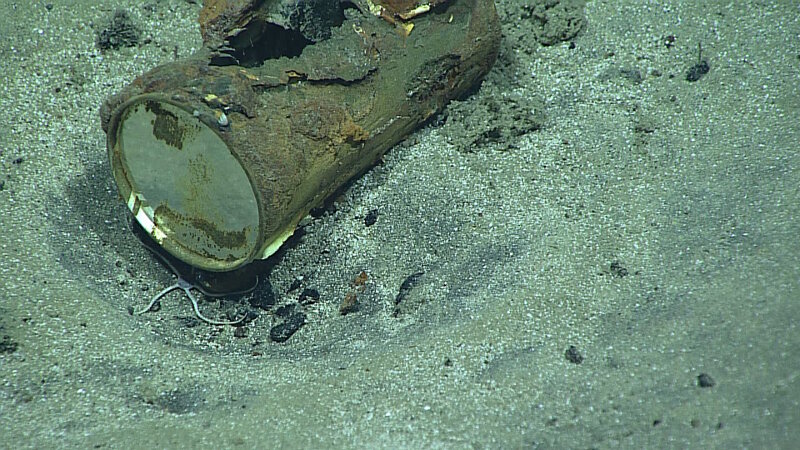
This can was observed on Dive 12 at Unnamed Forearc Seamount at a depth of 3,306 meters. Image courtesy of NOAA Office of Ocean Exploration and Research, 2016 Deepwater Exploration of the Marianas. Download larger version (jpg, 1.2 MB).
Through exploration and research, we now know that the ocean’s resources are limited. We have already seen the adverse effects of human impacts, from pollution to eutrophication to acidification to overexploitation. However, because we still know so little about the ocean, we do not yet know the full extent of these impacts. If the first time we observe and study vast areas of the ocean is after human influence, we lose our baseline that helps us gauge the severity of our own impact.
Ocean exploration is important for a plethora of socioeconomic reasons, but those reasons are useless if we don’t first understand how to sustainably use our resources. That is why the mission behind OER is so important. Their discoveries open up worlds of opportunities for global learning and future scientific and technological development.
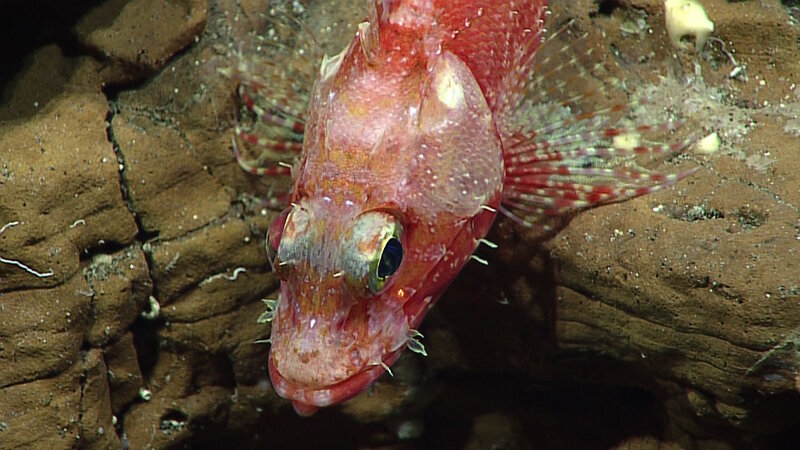
Scorpion fish were fairly common observations throughout the third leg of the Deepwater Exploration of the Marianas expedition. This one was observed on Dive 6 on Supply Reef. Image courtesy of NOAA Office of Ocean Exploration and Research, 2016 Deepwater Exploration of the Marianas. Download larger version (jpg, 861 KB).
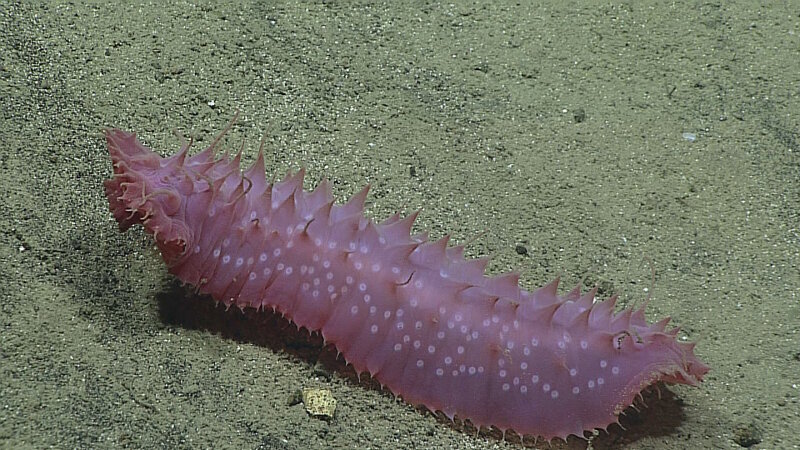
Sea cucumbers were one of the more common organisms seen on Leg 3 at almost every depth surveyed. This one was observed at Explorer Ridge Deep during Dive 14. Image courtesy of NOAA Office of Ocean Exploration and Research, 2016 Deepwater Exploration of the Marianas. Download larger version (jpg, 1.1 MB).